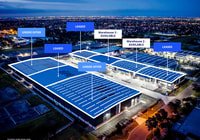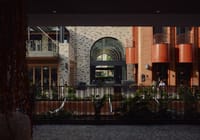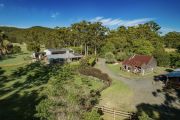
Caravan park boom pits private investors against major corporates
When family-owned investment group Moonah Tree Capital snapped up a caravan park in Victoria’s Mornington Peninsula, it became a small player in a rapidly expanding $10 billion industry increasingly dominated by major corporate investors.
But not only does the Thomas family, which is behind Moonah Tree, have long links to the area, its four principals – father Laurie, and siblings Scott, Felicity and Anthony – each have extensive finance and property expertise.

It’s that passion combined with their professional backgrounds which they are confident will enable them to hold their own in a market where their competitors are multi-billion dollar companies.
Moonah Tree paid $9.5 million for Blairgowrie Caravan Park and an adjoining block of land, outbidding a number of developers who were circling the two-hectare facility, with an eye for its land value.
Much-loved by generations of holiday-makers, the caravan park was established by Ross Harnett in 1965. It is about 500 metres from the local beach and village and has more than 100 sites and is residentially zoned – the feature which attracted developers during its sale campaign.
Scott Thomas, managing director at Moonah Tree Capital, said when his parents were in their 20s, they purchased a block of land around the corner from the caravan park in 1975 and ever since then, his family had spent every summer down the coast.
“We know the Mornington Peninsula really well from a holiday perspective,” he told The Australian Financial Review.
“The corporates have changed the market dramatically and prices have absolutely skyrocketed.”
Kevin Connolly of CRE Brokers
Thomas has watched property prices and holiday rentals skyrocket across the region over the years, with access to vacationing in the Mornington Peninsula becoming increasingly difficult.
“We thought that this specific caravan park was a fantastic opportunity to really build out a proposition that would allow more people to enjoy the Mornington Peninsula,” Thomas said.
Major players such as G’Day Group, which is majority-owned by super fund Australian Retirement Trust and has a $2 billion portfolio of holiday parks and resorts, and Tasman Group are setting the pace in the sector, snapping up long-held, family-run holiday parks. Investment yields have fallen as a result, an indication that prices are rising.
Domestic travel, especially for those under 50, has also come back since the pandemic, a boon for owners of hospitality assets.
Across Australia’s caravan parks and camping spots, visitors spent $10.6 billion in 2024, with the sector contributing $27.1 billion to the Australian economy – representing a surge of 46 per cent in the past decade, according to Caravan Industry Association of Australia research.
The 30 to 54 age group dominates the sector. Ten years earlier, the over-55 market was the largest demographic of visitors.
Kevin Connolly, founder of specialist real estate agency CRE Brokers which managed the sales campaign of the park, said just over a decade ago, caravan parks were always owned and operated by families.
“In particular the last five or six [years], corporates have come into the market,” he told the Financial Review. “There are some of the substantial public companies that have been buying the larger caravan parks because of the high cash flow they generate, and they’re underpinned by large, valuable parcels of land.
“The corporates have changed the market dramatically and prices have absolutely skyrocketed.”
Yields had compressed down from about 10 per cent to 14 per cent about a decade ago to around 8 per cent and 9 per cent because of the weight of their money competing against each other to purchase those assets, Connolly said.
In November, land lease developer and operator Hometown Australia offloaded Beach Haven Village in Ulladulla, NSW’s Shoalhaven region, for $9.23 million on a 7.18 per cent yield to a private syndicate.
ASX-listed retirement homes player Eureka Group has also just snapped up Benalla Tourist Park in Victoria’s Hume region for $11.7 million on an 8 per cent yield.
Andrew Jackson, national director for accommodation at HTL Property who brokered both these deals, said companies and land lease operators such as Ingenia and Eureka Group were more active among buyers whereas a decade ago, it was developers.
“It’s swung around. The industry’s matured, it’s a lot more corporatised,” he told the Financial Review. “Today’s resort style holiday parks can command average daily rates for cabins that would be the envy of nearby resort properties, and occupancy levels to match.”











